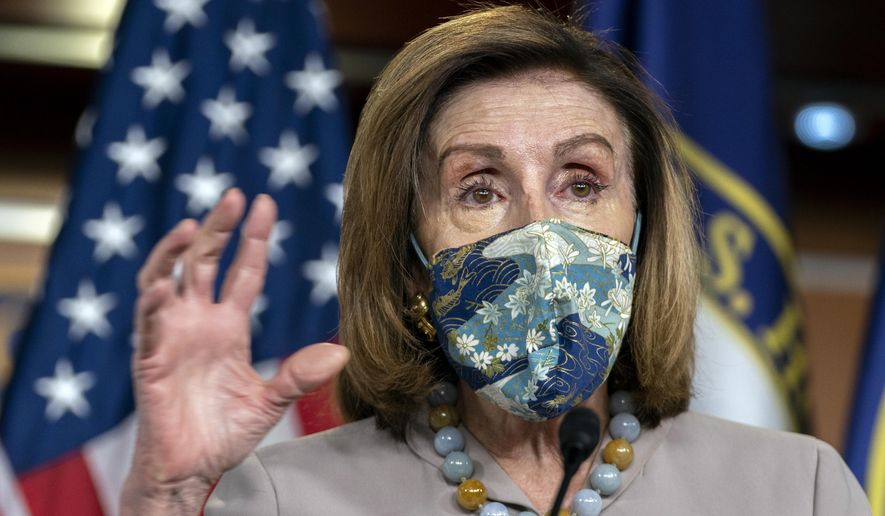OPINION:
No one is rooting harder for President Trump to lose and go away than House Speaker Nancy Pelosi.
Mr. Trump has made a sport of schooling Mrs. Pelosi and her radical Democratic allies. There was the border wall controversy, where she said she would give him $1 and he ended up with at least $11 billion for wall construction. There was her impeachment of Mr. Trump, which she held for a month for dramatic effect, only to find Americans became even less interested in her case over that time to the point the Senate laughed the case out of court.
Then there was the coronavirus stimulus legislation impasse, in which Mrs. Pelosi demanded vast and likely unconstitutional changes to America’s voting laws, walking-around money for Democrat state and local politicians, and a rollback of the limits on state and local tax deductions — which almost exclusively benefits only those earning $100,000 or more — and a $2.2 trillion price tag.
At present, the total is down to $900 million, the walking-around money, voting rules changes and rollback of state and local tax deductions are gone, and Mrs. Pelosi is being urged by moderates on her side to take the deal the White House is offering.
What’s more, Republicans are working on an issue that could be included in the coronavirus legislation and that would cast Republicans as friends and radical Democrats as the enemy of millions of working Americans — how to address the country’s many failing multiemployer pension plans.
About 10.8 million Americans — mostly unionized trades such as miners, manufacturers and truckers — participate in America’s 1,400 multiemployer pension plans. Last November, the Pension Benefit Guaranty Corp., the federal backstop for these plans, reported that they were collectively $65.2 billion under water — a record at the time.
If not resolved, and soon, many of these plans will begin to go under, and the Pension Benefit Guaranty Corp. itself will be unable to keep pace, members of Congress have said. This could lead to seniors finding their pension systems gone or the government finding itself forced to pass a massive aid package to rescue them.
Rep. Elise Stefanik, New York Republican, has authored a letter, signed by a number of her Republican colleagues, calling for the federal government to spend now to shore up troubled plans rather than wait for them to fail and face a massive bailout. She proposes — and others agree — that it should be part of the coronavirus relief legislation that still hasn’t passed the Senate.
The Senate, as currently composed, would seem to be amenable to such a change. Sen. Marco Rubio, Flordia Republican, told Axios last month the future of the Republican Party is “based on a multiethnic, multiracial working class coalition” that presumably would favor shoring up the pension plans of the nation’s truckers, carpenters and butchers.
Later in the month, Sen. Ted Cruz, Texas Republican, tweeted that “Today’s Dems are the party of the rich. GOP is and should be the party of the working class.”
Time is winding down for Congress this year. The defense appropriations legislation remains hung up on President Trump’s desire that it include language ending Section 20 of the Federal Communications Act, which exempts online platforms such as Facebook and Twitter from liability for the content others post on their mediums.
Year-in legislation must be worked out to continue to fund the government and to address whether certain tax breaks are extended into 2021 or allowed to expire Dec. 31.
That leaves the coronavirus relief legislation. It has been trimmed to a size and cost that Republicans in the Senate can accept, and the president has yielded to Democrat demands that it include substantial cash assistance for Americans still dealing with the virus, as well as money for vaccine distribution, local first-responders and small businesses.
Taking care of regular people also is the goal of proposals by Ms. Stefanik and others to reform the Pension Benefit Guarantee Corp. to avoid a collapse, and polling shows voters are worried about their pensions and ready for action, particularly in states such as Pennsylvania and Michigan, where nearly a half-million people in each state participate in these pension programs. In Pennsylvania and Michigan, 70% of voters say Congress must act now to preserve these plans, and similar percentages were recorded in Florida, Kentucky, Minnesota, Ohio and Wisconsin.
No wonder. Today’s plans are underfunded by $638 billion. More than 1.4 million Americans are in plans considered to be in “critical or declining status,” meaning if left unaddressed they could be looking at benefits cuts of 90% or more.
The people who suffer are the people the Republican Party plans to appeal to as its base going forward. So it behooves Republicans in the Senate to fix it and make pension reform happen for the American people.
• Brian McNicoll, a freelance writer based in Alexandria, Va., is a former senior writer for The Heritage Foundation and former director of communications for the House Committee on Oversight and Government Reform.




Please read our comment policy before commenting.